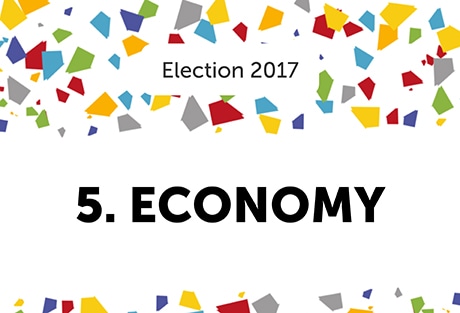Commercial Insights

In the penultimate issue of our election breakdown, we take a closer look at the policies which each party plans to put into place regarding the economy – including tax and business policies.
There’s plenty of hearsay about Labour not being able to be trusted on the economy, but take a look at their policies and see for yourself. Is the Labour manifesto any less ‘costed’ than that of Theresa May’s Conservatives?
Conservatives
- Ruled out a VAT rise
- Increasing the Inheritance tax threshold to £1 million per couple
- Reduction on tax relief on pension contributions of over £150,000
- Corporation tax to fall to 17% - lowest in the developed world
Whilst Theresa May sees the economy as a Conservative strong point, there’s not too much in their manifesto which actually addresses the concerns regarding it. That said, the Conservatives have pledged not to raise VAT again, which should ease some of the pressure on purchase prices within the country.
She also has said that there are no plans to raise income tax or National Insurance, but unlike in 2015, there is no binding pledge in the manifesto that shackles the Conservatives to this promise.
They plan on dropping the corporation tax level to just 17%, which has been claimed to be one of the lowest rates in the developed world, in stark opposition to Labour, Lib Dem and Green plans to raise the tax to help fund public services.
The manifesto also confirms numerous pledges that were made under David Cameron, such as the raising of the 40p tax limit to £50,000 and tax-free personal allowance raising to £12,500.
Labour
- Pledged not to raise income tax for those under £80,000 a year
- Raising corporation tax by 7% for big business over 5 years
- Reversal of Tory cuts to Capital Gains Tax
- £100 billion for a publicly owned investment bank
Jeremy Corbyn’s investment programme had to be clearly costed to try and make people believe in a Labour administration again, and thus the figures for the Labour Party are actually far more clear than anyone else’s.
It’s evident that Corbyn’s ‘Robin Hood’ Tax is part of the deal, with the wealthiest 5% expected to take a small hit to help fund public services, whilst the majority of the country would take no income tax increase.
There’s also the matter of big business, and Labour have stated that they will increase corporation tax by 7% - from 19% to 26% by the end of the next government – for big businesses. Smaller businesses take a smaller hit, only to 21%, but they will also benefit from loans from small regional development banks.
Labour also plans to pump £250 billion back into the economy to create jobs, over 5 years, in a strategy similar to that which Obama employed during the financial crisis – and there’s £100 billion for a new publicly owned investment bank, which would be then expected to raise another £150 billion from its investments.
Liberal Democrats
- Increasing income tax by 1p per person to fund public services
- Abolition of the married couples tax allowance
- Alcohol given minimum prices by law
The main Lib Dem policy regarding tax and business is the raise of income tax by 1p per person in order to fulfil their promise of extra funds for public services, although they have also said that they will roll back Tory Inheritance Tax and Capital Gains Tax cuts.
On top of this, Tim Farron has pledged a slight raise to corporation tax, up from 19% to 20%, and also a full review and reform of business rates once the election is completed and there is a time to reflect and make changes.
Farron has also pledged to make a legal bottom limit on what alcohol will cost, attempting to combat the problem of cheap alcohol being mistreated, and raising the government money in the process; and the Liberals have pledged to scrap the married couples tax allowance.
Green Party
- Raise income tax for the better off
- Raise corporation tax for big businesses
- Scrapping of the Tory inheritance tax allowances
The Green Party manifesto on business is similar to Labours in many ways, suggesting that the better off should fund the majority of the work that needs to go into the public sector over the next few years.
Their plans to raise income tax for the top bracket of earners, as well as increasing corporation tax heavily on big businesses, is not too far away from Jeremy Corbyn’s plan with the Labour Party.
UKIP
- £10 billion a year cut in foreign aid.
UKIP’s financial policy is centred around the idea that sending foreign aid to countries less well off than the UK is a waste of public funds, and could be better spent serving the people of Britain.
As such, their plan to fix the NHS and restore Britain to its former glory is based around the £10 billion a year they feel could be taken away from foreign aid and pumped back towards the UK.
Academy tools to help you get a job
-

Free Watson Glaser Practice Test
Understand the test format, compare your performance with others, and boost your critical thinking skills.
